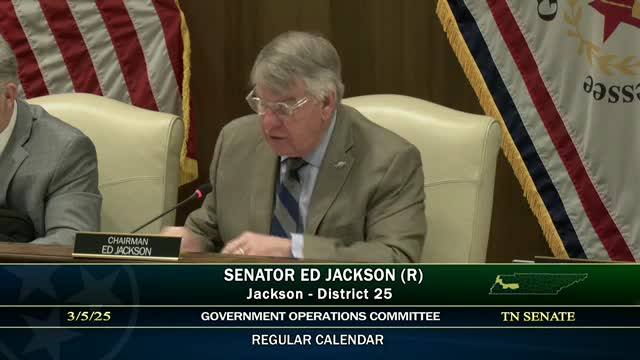Senate panel advances bill to create advisory work group on pay for direct support workers

Summary
The Senate Committee on Government Operations voted unanimously March 5 to advance Senate Bill 321, which would create an advisory work group to study reimbursement rates for direct support workers and make budget recommendations to state agencies and the governor.
The Senate Committee on Government Operations on March 5 voted 9-0 to advance Senate Bill 321, a measure to create a statewide advisory work group to study provider reimbursement rates for direct support workers and recommend changes to state agencies and the governor ahead of each budget cycle.
The bill, sponsored in committee by Senator Massey, directs appointments to the task force by the House speaker and the lieutenant governor. The panel is intended to review pay and reimbursement for frontline staff who provide in-home and long‑term care to people with disabilities, mental‑health needs, elderly Tennesseans and children, and to compare those rates with equivalent jobs in the private sector and other states.
Proponents told the committee that turnover and low pay among direct support professionals threaten continuity of care for people who rely on 24/7 services. "When you're providing ... 24/7 care, you have to have somebody there," Senator Massey said in committee testimony. The bill attaches the advisory group administratively to the Department of Labor and Workforce because sponsors framed it primarily as a workforce issue. The state Medicaid program, TennCare, and other state agencies will serve ex officio on the panel, the sponsor said.
The bill includes an amendment, identified in committee as amendment 4414, which was moved by Senator Rose and seconded by Senator Southerland and adopted by voice vote. Committee members then approved the amended bill on a roll-call vote, sending it to the Senate Health Committee with a positive recommendation.
Committee members asked whether the advisory group's recommendations would be binding on departments and agencies. Senator Oliver asked whether the panel could compel agencies to raise rates; the sponsor replied the recommendations would not be mandatory but would be provided to agencies and the governor to inform budget requests and advocacy during the annual budget process.
The committee discussed membership terms and a sunset provision briefly and requested legal clarification during the meeting. The sponsor and other senators gave varying statements about initial appointment lengths; the sponsor said she did not see a two‑year sunset and described staggered initial terms for appointees, and legal staff directed members to section 2 of the bill for the precise term language. The bill text adopted in committee will govern the appointments and terms.
The measure was presented as focused on the lowest‑paid frontline staff rather than mid‑level professionals such as dentists or psychiatrists, though members said the panel could expand its scope if it chose. Committee members repeatedly cited competition from private employers — retailers and fast‑food chains paying higher wages for entry‑level work — as a factor undermining provider staffing.
The committee record shows a formal amendment action (moved by Senator Rose; seconded by Senator Southerland) adopted by voice vote and a final roll-call vote recorded as 9 ayes and no nays. The bill now moves to the Senate Health Committee for further consideration.
The committee hearing included multiple expressions of support from members who described the bill as a mechanism to provide continuity and data ahead of budget negotiations rather than an immediate funding authorization. The bill does not itself appropriate money; sponsors said any recommended changes that require funding would be considered during the governor's budget process.

